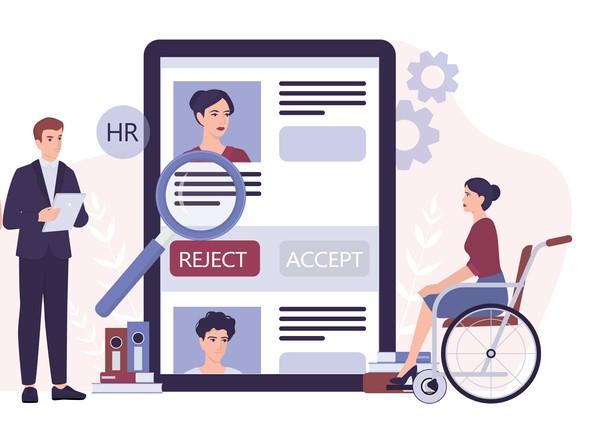
‘It just isn’t safe to disclose’
Neurodiverse academics face real and significant barriers to achieving positions of educational leadership. Here are considerations for universities to make promotion more equitable
Neurodiverse academics with dyslexia, attention deficit hyperactivity disorder (ADHD) and autism are often under-appreciated, inadequately supported and underutilised, according to our research. They often actively “shun” promotion or leadership positions owing to what amounts to not only a lack of support, but also, in some cases, systematic discrimination and the normalisation of an ableist environment that can be so deeply entrenched to warrant claims that it is simply “isn’t safe to disclose”.
Universities must start the work of providing equity of support for all. Inclusion must not remain a strategic priority merely for fee-paying students (customers) while institutions pay lip service to the needs of neurodiverse academics (by fobbing them off with occupational health referrals or avoiding implementing what can be perceived as costly or time-consuming “reasonable adjustments”).
A starting point, of course, must be the legal protections afforded by employment law. The UK’s Equality Act (2010) defines “disabilities”, such as specific learning difficulties, as a protected characteristic. The act protects against discrimination and requires employers to make reasonable adjustments to reduce the impact that an employee’s disability has on their ability to perform effectively in their role. Furthermore, the Public Sector Equality Duty (2011) requires public bodies to: 1) eliminate discrimination; 2) advance equality of opportunity; and 3) foster good relations among people when carrying out activities.
- Advice for making your campus neurodivergent friendly
- How to create inclusive spaces for inclusive events
- Let’s get real about hiring people with disabilities
Neurodivergent academics often become academically successful through sheer grit and determination to overcome their challenges, but they still encounter significant issues relating to cognitive overload, working memory and sequencing, writing and recalling information, and organisation or communication. Not all these difficulties can be alleviated through assistive software. Our study of 35 neurodiverse respondents from across the UK sector, which has yet to be published, aimed to ascertain what kinds of challenges neurodiverse academics face in their day-to-day practice. The study also sought to understand how the positive aspects of neurodiversity contribute to success in an academic role.
We asked participants to elaborate on the talents their neurodivergence has given them, and responses included the “capacity for deep focus and immersion in a task”, “attention to detail”, “looking at the whole picture empathetically and valuing justice”, “strong sense of values, mission and ethics”, “work ethic”, “bringing in new ideas or changes”, “dedication and focus”, “creativity”, “seeing across problems”, the ability to “spot patterns and join dots, to also see into the future as to how a whole system/process is going to play out”, “pattern recognition”, a “quick mind”, “understanding of what some students are experiencing” and “championing our diverse student body”.
These are all valuable traits within today’s diverse, complex institutional environments, yet many respondents reported lack of support (20 per cent rated their institution’s support at one out of 10), that research was “impossible” owing to lack of time (as more time was needed in other areas to compensate for the challenges associated with their neurodivergence), project management and grant systems being inaccessible due to “vague and non-specific” criteria, “opaque processes”, burnout and lack of energy (owing to having to compensate for the challenges presented by their neurodivergence) and lack of tolerance.
One striking aspect of our research, however, was the topic of leadership and promotion into leadership positions.
Among respondents’ comments (particularly those with autism, who ranked leadership as their top challenge in their day-to-day practice) were comments that they hid their neurodivergence for fear of stigma and resented what they saw as “internalised ableism”. They also claimed they had been overlooked for promotion owing to their neurodivergence or simply did not apply for promotions because they saw themselves as “no good at the political side” of leadership. Many said that not only was their neurodivergence an intrinsic barrier to leadership positions, but that the requirement to put on a polished performance in interviews, coupled with the fact that “often the requirements hit all my weaknesses and do not play to my strengths” rendered promotion either unobtainable or undesirable. As one respondent put it: “It would be good to have more opportunity for my strengths to be used rather than having to fit in with everyone else in their non-dyslexic world.”
Some respondents mentioned that colleagues subjected them to banter in front of others about the traits associated with their neurodiversity, and others mentioned that the characteristics associated with their neurodivergence were perceived by more senior management as “odd” or even “concerning”. One respondent with dyslexia mentioned that their ability to see connections and implications by “joining the dots” had been described as “erratic” and “unfocused”. Another put it beautifully: “I do believe both dyslexia and ADHD create a huge barrier to leadership as my neurodiversity is too ‘different’ from the others around me. I have been asked to essentially mask my personality to fit more into the ‘academic’ environment.”
Another said: “I would love to see the same support for students extended to faculty. Right now, it just isn’t safe to disclose.” While discussing what could be done to remedy this situation, a respondent stated that “making all aspects of the profession less impenetrable, alienating, ancient and attention-thwarting would be a good start”.
These findings should be a wake-up call to us all, especially since most institutions have what appear to be robust equity, diversity and inclusion (EDI) policies that purport to support neurodiverse staff. Given the strengths neurodivergence brings to academia and academic roles in all aspects of teaching, assessment, research, leadership and administration, employers ought to be doing more to develop, support and retain this talent.
What needs to be considered is how can we improve the working environment for neurodiverse staff members to render the application of reasonable adjustments equitable across both students and staff. Initial ideas might include:
- Greater understanding and empathy: line managers, senior management and so-called “change agents” such as educational/staff developers should apprise themselves of the main challenges faced by neurodiverse academics – and, equally importantly, the main strengths – to adapt their support and advice accordingly.
- Provide bespoke support or mentoring (especially for educational leadership): many respondents in our study, especially those with autism, identified the expectations associated with leadership as a major barrier.
- Implement reasonable adjustments: the most pressing area concerns marking. Extra time, like that provided to neurodivergent students, would alleviate cognitive overload issues associated with the challenges neurodiverse academics face in finding workarounds or implementing compensatory strategies to overcome their challenges.
Adrian J. Wallbank is a principal lecturer in education and student experience, and Andrew Page-Towers is a lecturer in paramedic science, both at Oxford Brookes University.
If you would like advice and insight from academics and university staff delivered direct to your inbox each week, sign up for the Campus newsletter.


